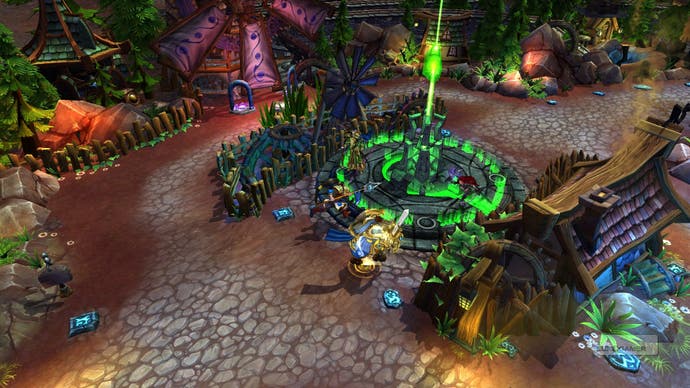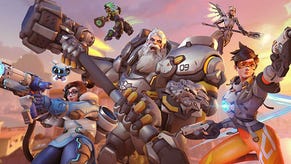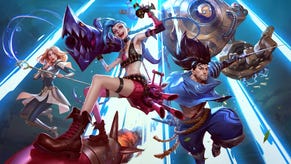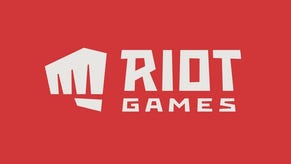League of Legends: Dominion
LoLers divide and conquer.
"You need to learn the mechanics of how to co-ordinate a capture. You need to learn a different type of map awareness," says Design Director Tom Cadwell, who previously worked on Warcraft 3. The pace of the game is incredibly quick, with matches now coming in at the twenty-minute mark. The hope is that this will appeal to new players after a quick gaming fix, as well as LoL’s existing community. LoL players will certainly recognise the feel of their favourite characters and Riot has nudged rather than tipped the scales.
Though it’s a fast game, Tom and his team have spent a long time poring over the minutiae of Dominion. Over the last nine months it has been endlessly re-tweaked and redeveloped in what he calls a "constant, iterative process." Wanting to incorporate all the old LoL characters and abilities into a new framework was a challenge.
"We tried several map layouts. We started with an X-shape, we tried a figure 8 pattern, we tried a bunch of different spawn rules, we tried twelve different versions of a reward in the centre. We really kicked the tyres on this one. We made sure that all character types are effective. We made sure that teams can’t snowball to a victory."
The rewards he speaks of are speed power-ups in the centre of the map, while the new spawn rules cover a modification to the traditional minions, which now spawn from any locations your team has captured that are near enemy bases. If left unchecked, they can and will capture those locations for you.
Both Tom and Marc have a lot to say about the endless iterations that LoL and Dominion have gone through, seeing the finely honed and repeatedly re-balanced gameplay as the game’s strength. It’s also an area its rivals, including Newerth and Demigod, have been accused of falling down on.
It’s this rigorous testing of an endlessly evolving game, complimented by an enormous community’s endless feedback, that has Riot seeing any competition almost as an irrelevance.

"We do think we’re in the leadership position in this genre," says Marc, "Our goal always was, and always will be, to deliver value to players, and I think we’re winning in the people’s court, that the approach is working." On paper, Riot’s business model may look a little loony: the game is entirely free to play and players gain no bonuses through buying extras that they couldn’t earn in the game anyway, yet the game is very profitable and a lack of subscription costs allows for an enormous player base, meaning anyone anywhere can find opponents or allies at any time of day. Dominion, like the rest of LoL, won’t punish casual players who hop in for the occasional game, an example of what Tom describes as "reaching our player base in as many ways as we can."
This broad, all-inclusive approach means Marc doesn’t expect to lose players to Valve or, indeed, anyone else, and certainly isn’t losing sleep over the competition. "We’re really focused on our future and on just continuing to evolve," he says. "We’re focused on trying to develop these great relationships so that, when people do go elsewhere, they recognise that many of those other experiences are not firing on all the same cylinders, and so they want to come back. I think that’s some of the pattern we’ve been seeing."
Valve’s trademarking of "DotA" caused some controversy, and many DotA players felt it was unfair to trademark what was a fan-made and community-supported mod. The former DotA developer on the Valve team is known as Ice Frog, and took over development of DotA in 2005, before joining Valve in 2009. His predecessor, Steve Feak, is now at Riot, alongside another key DotA figure, Steve Mescon. When I ask Marc if he or any of his colleagues feel disappointed, even betrayed by Ice Frog’s decision not to work with them, but for a company who now own the name of their not-for-profit inspiration, he’s guarded with his answer.
"I have a lot of thoughts about that," he says, but he doesn’t want to talk about personalities. "At the end of the day, we’ll see what shakes out. You’re going back seven years of all the different relationships. There’s a lot of history there and it’s a pretty complicated situation. Our philosophy is we’re all about the players; we’re all about the community."
It’s that community he wants to return the discussion to as he focuses on a DotA team member he has, rather than one he hasn’t: Steve Mescon, also known by his handle "Pendragon".
"I think that guy is an absolute prodigy. I think he, more than any other individual, is the reason DotA was as successful as it was." Steve was just a teenager when he effectively created the DotA community website that, as Marc puts it, "centralised the community, that allowed it to reach critical mass. He defined and drove the values-oriented approach that this is by gamers, for gamers."
It certainly looks like Riot has kept Steve’s values close to their heart. Dominion is also by gamers, for gamers, and previewing to the press is a little uncharacteristic of Riot - its enormous community usually gives its game more than enough momentum. Ultimately, it’ll be that community response it will be most interested in and, should any rivals want to encroach on their territory, it won’t just be the game itself they’ll be challenging. It will also be the loyalty of an enormous and very content fanbase.








